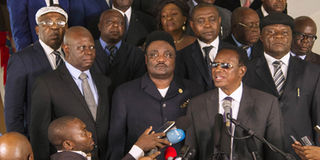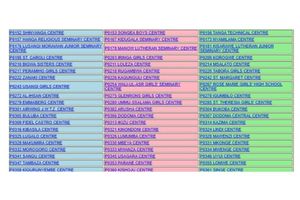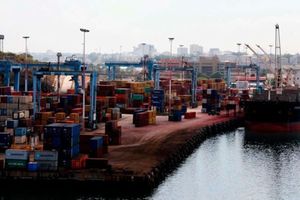DR Congo president names new Premier

A file photo taken on Tuesday shows a group of Congolese opposition figures among which on the first row is Roger Lumbala (right), newly elected Prime Minister Bruno Tshibala (centre), and Joseph Olenghankoy (second left) and Ingele Ifoti (left) seen at the “Palais de la Nation” in Kinshasa. PHOTO | AFP
What you need to know:
- Bruno Tshibala, a spokesman for the “Rassemblement” (Unity) coalition of parties opposed to Kabila’s rule, will replace Samy Badibanga, who resigned as prime minister earlier Friday.
- But the party, formed by veteran opposition leader Etienne Tshisekedi, has struggled to live up to its name.
Kinshasa. President Joseph Kabila on Friday named an opposition leader as prime minister for the Democratic Republic of Congo, honouring a pledge made as part of a stalled power-sharing deal agreed in December.
Bruno Tshibala, a spokesman for the “Rassemblement” (Unity) coalition of parties opposed to Kabila’s rule, will replace Samy Badibanga, who resigned as prime minister earlier Friday.
But the party, formed by veteran opposition leader Etienne Tshisekedi, has struggled to live up to its name.
Tshisekedi was to have led the transitional watchdog overseeing the power-sharing accord, but his death in February threw the Unity grouping into turmoil.
Tshibala in particular contested the push by Tshisekedi’s son Felix to take over as leader, prompting his exclusion from the group as well as the UDPS party.
While announcing his plan to name a new premier on Wednesday, Kabila urged the opposition “to overcome its internal squabbles” and hand him a list of candidates for the post of prime minister.
The appointment of a new premier is part of the deal brokered by the influential Catholic church on New Year’s Eve, which aimed to avoid a full-blown crisis in the central African country after Kabila refused to step down when his second and final five-year term ended in December.
The agreement would allow Kabila, 45, to remain in office until elections in late 2017, ruling in tandem with a transitional watchdog and a new premier chosen from within the opposition ranks.
Violence has flared across the central African country of 71 million people amid fears of a continued delay in this year’s promised elections.
The country, which suffered through two wars between 1996 and 2003, has not had a democratic transition of power since its independence from Belgium in 1960. (AFP)




